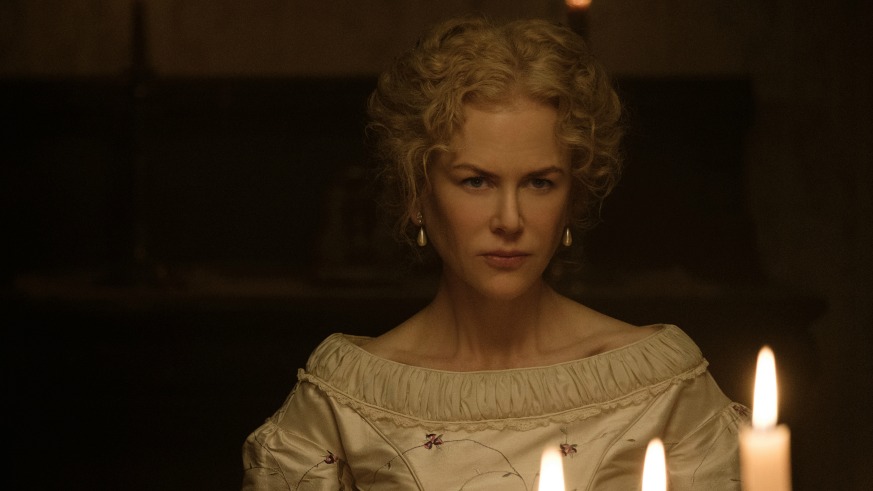‘The Beguiled’
Director: Sofia Coppola
Stars: Nicole Kidman, Colin Farrell
Rating: R
4 (out of 5) Globes
The original “The Beguiled” sounds, as they say today, “#problematic.” For starters, it stars Clint Eastwood. Made in 1971, this Southern Gothic potboiler finds the era’s manliest man playing a wounded Union solider during the Civil War, trapped in an all-girls school with repressed women. It doesn’t end well. Its director, Don Siegel — a right-winger who later that year gifted the world with “Dirty Harry” — once remarked that it was about “the basic desire of women to castrate men.” In other words, it sounds like exactly the kind of film that should be remade, over four decades later, by one of our most acclaimed female filmmakers, only right this time.
But not so fast. The original isn’t so easily taken down. The weirdest film on Clint’s CV — that or the musical “Paint Your Wagon” — it’s fascinating because it finds a macho filmmaker and his even more macho star wrestling with material that should activate their inner he-men. But it doesn’t. Instead, it’s a rich and strange battle between the lurid and the sensitive, the sexist and the subtle. It gives us no one to root for and no one to root against. To put it another way, it’s complicated. (And a bit of a masterpiece.)
Sofia Coppola’s loose (but not that loose) remake is complicated, too. Though her “Beguiled” has been sold as a rah-rah girl power corrective — or just a chance to ogle an oft-shirtless Colin Farrell, Eastwood’s more doe-eyed replacement — Coppola’s simply not that kind of filmmaker. She’s not terribly political. She doesn’t even (apparently) know what the “Bechdel Test” is, nor can she satisfyingly explain why she removed the black slave character from the original. (In the Siegel, the charcter played by singer Mae Mercer is the most sympathetic and richest character.) Though the two “Beguiled”s are very different, they’re the same in a key way: Both are thrilling works of art too complex for sometimes reductive think pieces.
Coppola doesn’t so much pull a gender-flip as view the story once told by a man through a woman’s eyes. But she still doesn’t pick sides. Farrell’s John is a touch more likeable, while the womenfolk are considerably less hysterical. The ages range from little girls to a horny teen (Elle Fanning) to the older charge: a teacher (Kirsten Dunst) and the head-mistress (Nicole Kidman). They know they should turn John into the Confederates. But they haven’t seen a man in ages. And he looks like Colin Farrell. And he’s polite. And grateful. And almost suspiciously complimentary. Sure enough, as he recovers, John makes like a fox in a henhouse, though perhaps he hasn’t lucked into a male fantasy so much as found himself trapped in a female one.
And what a female fantasy. Coppola spends much of her efforts dwelling on stolen moments of razor-sharp hotness: charged glances, slack-jawed stares, Kidman slowly, slowly, slowwwwly washing John’s shirtless bod. There’s only one sex scene, and it lacks a lick of flesh, but this is one sexy movie. Coppola doesn’t even use music, save two or three brief ambient passages by her husband’s band, Phoenix. She wants nothing to distract us from the deafening sounds of red hot lust.
“The Beguiled” may be the most audience-friendly film Coppola’s made, but it’s still a Sofia Coppola movie. It’s another languid hang in a cloistered (and, yes, as it were, alas, blindingly white) world, away from the outside world. It’s all pretty pictures and pretty dresses and pretty women (and a very pretty man). It’s all surfaces. But the surfaces in Coppola’s films always shatter — from the ’70s suburbia, at once heaven and hell, of “The Virgin Suicides” to the Versailles of “Marie Antoinette” to the modern-day Los Angeles of “The Bling Ring,” where every celebrity’s house is waiting to be looted. So it goes with “The Beguiled.” It must be said that Coppola slightly bungles the shocker of a climax; Siegel did it better. But her version is at its best before the release, when it’s all about the sick tension bubbling under the surface like lava below magma.
Follow Matt Prigge on Twitter @mattprigge

























